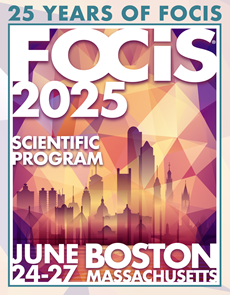Autoimmune Diseases
Session: Immunoengineering and Therapeutics
Induction of Antigen-Specific T Cell Tolerance by CNP-104 Positively Affects Clinical Response in Primary Biliary Cholangitis (PBC)
Thursday, June 26, 2025
4:40pm - 4:55pm East Coast USA Time
Location: Salons F-G
Christopher Bowlus – University of California Davis; Molly Frey – COUR Pharmaceuticals; Derrick McCarthy – COUR Pharmaceuticals; Erik Wambre – Precision Immunology Institute, Icahn School of Medicine at Mount Sinai; Stephen Caldwell – University of Virginia; Roberto Firpi-Morell – University of Florida; Brett Fortune – Montefiore Medical Center; Michael Galambos – Digestive Healthcare of Georgia; Stuart Gordon – Henry Ford Health, Wayne State University School of Medicine; Denise Harnois – Mayo Clinic Florida; Tarek Hassanein – Southern California Research Center; Matthew Kappus – Duke University School of Medicine; Eric Lawitz – Texas Liver Institute; Scott McHenry – Washington University School of Medicine in St. Louis; Bhaktasharan Patel – Peak Gastroenterology Associates; Raymond Phillips – GI Pros Research; Daniel Pratt – Massachusetts General Hospital; Jatinder Pruthi – Om Research; Govarthanan Rajendiran – Sanford Medical Center; Gautham Reddy – University of Chicago; Manuel Rodriguez – Florida Research Institute; Marina Silveira – Yale School of Medicine; Bobby Zervos – Cleveland Clinic Weston Hospital; Paul Peloso – COUR Pharmaceuticals; M Eric Gershwin – University of California Davis
- AE
Adam Elhofy, PhD
COUR Pharmaceuticals
- MF
Molly A. Frey, PhD
VP of Research and Innovation
COUR Pharmaceuticals
Skokie, Illinois, United States
Presenting Author(s)
Co-Author(s)
Abstract Text:
Background: PBC is an archetypal autoimmune disease where the dominant autoantigen is mitochondrial PDC-E2. Hitherto, PBC treatment has been neither specific nor directed toward restoration of tolerance. CNP-104, a tolerogenic nanoparticle encapsulating PDC-E2, is hypothesized to restore tolerance to pathogenic T cells.
Methods: We conducted a Phase 2a First-in-Human randomized controlled trial of CNP-104 in PBC patients unresponsive/intolerant to ursodeoxycholic acid. The 42 enrolled subjects were randomized 2:1 to receive two doses of CNP-104 or placebo (PBO) one week apart and were followed for 120 days to assess safety and treatment durability.
Results: CNP-104 was safe and well-tolerated. Compared to PBO, the CNP-104 group had a reduced percentage of antigen-specific Th17 T cells and increased antigen-specific tolerogenic CD8+ T cell counts (TIGIT, GARP). ALP, ALT, and total bilirubin were similar between groups. Clinically relevant effects on albumin levels, liver stiffness, and the rate of change in 5-year UK-PBC risk for liver outcomes were improved in the CNP-104 group compared to PBO.
Conclusions: This trial is limited by small size and data variability. Induction of antigen-specific T cell tolerance, shown by reduced Th17 cells and increased TIGIT and GARP cells correlates with improved liver stiffness, albumin, and UK-PBC. These findings suggest the CNP-104 tolerogenic mechanism of action translates to clinical benefits. These data support future studies with this unique therapeutic platform to treat PBC.
Background: PBC is an archetypal autoimmune disease where the dominant autoantigen is mitochondrial PDC-E2. Hitherto, PBC treatment has been neither specific nor directed toward restoration of tolerance. CNP-104, a tolerogenic nanoparticle encapsulating PDC-E2, is hypothesized to restore tolerance to pathogenic T cells.
Methods: We conducted a Phase 2a First-in-Human randomized controlled trial of CNP-104 in PBC patients unresponsive/intolerant to ursodeoxycholic acid. The 42 enrolled subjects were randomized 2:1 to receive two doses of CNP-104 or placebo (PBO) one week apart and were followed for 120 days to assess safety and treatment durability.
Results: CNP-104 was safe and well-tolerated. Compared to PBO, the CNP-104 group had a reduced percentage of antigen-specific Th17 T cells and increased antigen-specific tolerogenic CD8+ T cell counts (TIGIT, GARP). ALP, ALT, and total bilirubin were similar between groups. Clinically relevant effects on albumin levels, liver stiffness, and the rate of change in 5-year UK-PBC risk for liver outcomes were improved in the CNP-104 group compared to PBO.
Conclusions: This trial is limited by small size and data variability. Induction of antigen-specific T cell tolerance, shown by reduced Th17 cells and increased TIGIT and GARP cells correlates with improved liver stiffness, albumin, and UK-PBC. These findings suggest the CNP-104 tolerogenic mechanism of action translates to clinical benefits. These data support future studies with this unique therapeutic platform to treat PBC.

